Lazarita 2

Sumi Ink, metal leaf, and watercolor on paper, 17" X 22"
Lazarita Angarica with Lourdes Tamayo and Andrea, January 2006, Perico, Cuba.
Lazarita:…cuando el Eleggua de Hilda viene siempre nos dice que las canciones de Aguiday, de Osain, de Malé…
Lourdes: ¿tú puedes hacer un fragmentico de una canción de Aguiday? Porque es primera vez que lo escucho
Lazarita: ayer tu no lo escuchaste en el papel, ¿no lo tienes? Es 'aguidday nasaoro oggun e ma do mi do, oggun e ma do mi do nasa, do mi do e, Aguidday nasa' y entonces luego de esas dos canciones para la despedida, entonces se cantan dos canciones que son de felicidad, de lo bueno que quedó el tambor, de lo bien que quedó el tambor, de la satisfacción que por lo menos el dueño de la casa con el que nosotros tenemos que quedar bien, quedó bien. Es así toda la trayectoria de un toque, en tantas horas, pero es solamente eso, quedar bien y cumplir con lo establecido que ellos piden.
Andrea: ¿cuál es el significado del canto 'llama malodde'?
Lazarita: Ah mira, el significado es que Eleggua siempre está 'vamos a joder y vamos a joder y vamos a joder' y yo le digo 'tú me dices, vamos a joder y después me echan la culpa a mí de que Eleggua me ha dado a entender, no porque me lo hayan explicado sino de razonamiento mío, me ha dado a entender para que los santos sepan que el tambor está tocando, para que siempre tengan presente de que el tambor tiene el fundamento que debe tener, para que los santos y el tambor al mismo tiempo tengan el fundamento y le den vista a aquellas personas que están detrás del tambor, que mira a aquél, que se burlan de este, se burlan del otro porque el tambor está malo y porque está pasando algo que no está sonando igual. Entonces, ahí es donde Eleggua siempre me dice 'canta y vamos a joder a unos cuantos para que demuestre una vez más de que en realidad el fundamento está ahí.
Es como en el toque de bembé, en el toque de bembé hay una canción que ellos le cantan directamente que si quiere decir, que dice directamente el significado de esas palabras, es directamente de que ellos tienen vergüenza pues nosotros lo transmitimos de otra forma, Eleggua lo da a entender de otra forma, como el dice que él es el padrino, esta casa es de Changó, pero él es el padrino del tambor. Porque casi siempre cuando nosotros empezamos a tocar y Eleggua nosotros tuvimos un toque de que no venía ningún santo porque todo el mundo tu sabes que es que se sube y sale de su casa, preparado y que si tiene los dedos cruzados, que si esto, que si lo otro, que si el collar tiene nudos, entonces Eleggua ahí siempre viene para que se sepa que si el fundamento está y entonces cuando él me dice a mí que cante esa canción es porque ya él por algún rincón hizo una obra que todo el mundo va a caer, así tenga cruz, tenga collar con nudo, tenga lo que tenga.
Lazarita: …When Hilda's Eleggua comes, he tells us to sing for Aguidday, Osain, Malé…
Lourdes: Can you sing a piece of one of his chants? Because it's the first time I have heard about him.
Lazarita: Didn't you hear it yesterday? Don't you have it on the paper? It's 'aguidday nasaoro oggun e ma do mi do, oggun e ma do mi do nasa, do mi do e, Aguidday nasa' and after those two farewell chants, we sing two more that mean happiness for how well the ceremony turned out, to the satisfaction, at least, of the owner of the house, because we should always be on good terms with him. That is the tradition of a ceremony, you are playing and singing for so many hours, but it's mainly that, you have to carry out the ceremony in the established order that they have asked for.
Andrea: And what's the meaning of this chant 'llama malodde'
Lazarita: Ah, look the meaning is that Eleggua is always saying 'let's tease people, let's tease people' and I tell him 'you are always telling me to tease people and then they blame me for everything that happens'. I believe that Eleggua wants to demonstrate that our drums have the sacred consecration they are supposed to have. In a ceremony you may find people laughing at you or mocking the ceremony and that's when Eleggua tells me 'let's sing and let's tease some people here to show them our sacred consecration is really present.' In bembé they also have a chant that expresses the same thing, but we perform it in a different way. Eleggua says he is the godfather of the drums, this house belongs to Changó, but he (Eleggua) is the godfather of our drums. Once we were in a ceremony and nobody got possessed because you know, people prepare different things at home so they won't be possessed, they have this, that and the other thing, like crossed fingers or tied necklaces, but when Eleggua tells me to sing that chant, it means everyone will become posessed, because although they may have prepared something at home, and although they think they are immune, they'll fall into trance anyway, whether they have a cross, a necklace, or whatever.









